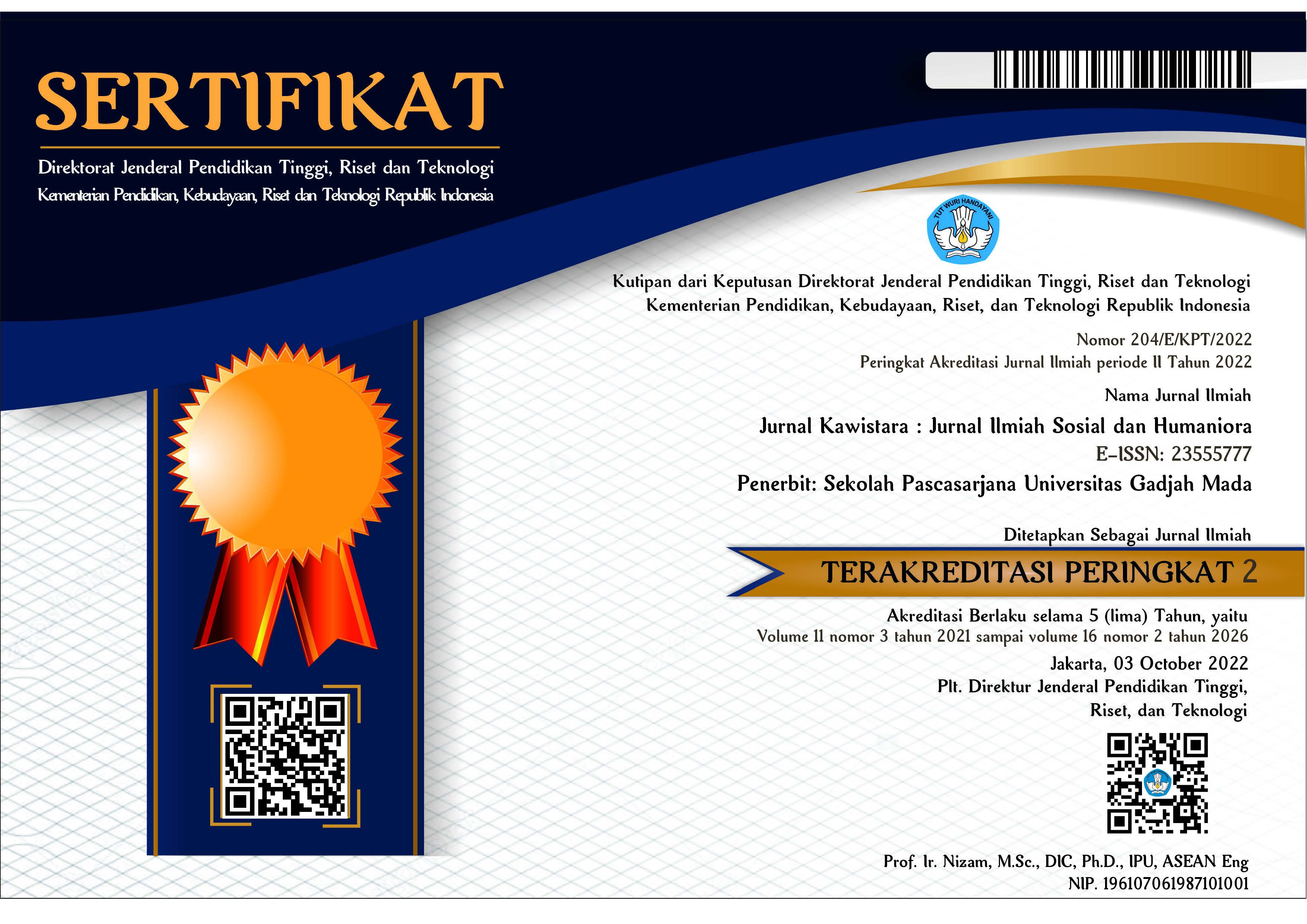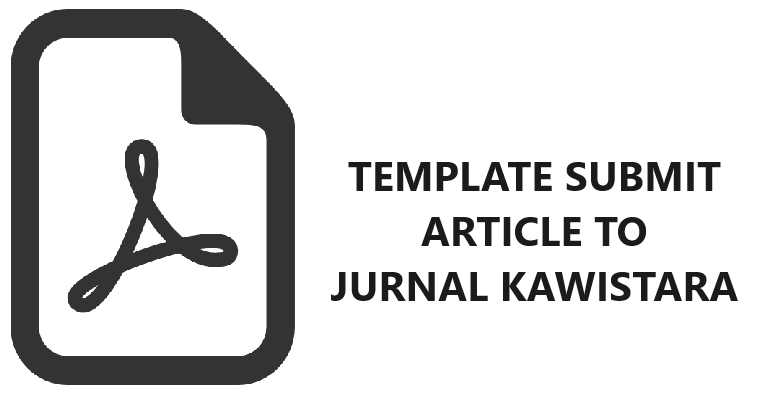KRITIK ATAS TANGGUNG JAWAB SOSIAL PERUSAHAAN DALAM BENCANA LUMPUR LAPINDO
Lutfi Amiruddin(1*)
(1) Sociology Department, Universitas Brawijaya
(*) Corresponding Author
Abstract
In Lapindo mudflow disaster, the process of sale and purchase mechanism of sinking assets is legitimated by Presidential Decree 14/2007 (Perpres 14/2007), claimed by Lapindo as their social responsibility. In the discussion over the causes of the disaster, this scheme also raises controversy. If it was caused by an earthquake, why the company is willing to spend money to buy survivors’ assetas as form of social responsibility? On the other hand, the mechanism made conflict among the survivors. I used qualitative method; using indepth interview, observation, and literature study. I chose some informants from different side to get various perspective, such as Lapindo and survivors, in order to get the corporate social responsibility narratively and its critics. Using the concept of governmentality of Foucault, I reveal the process of Corporate Social Responsibility (CSR) in the ecological crisis in Sidoarjo is only a way to cover the mistakes that have been made, not to recover the survivors’ social and ecological conditions. The mechanism above implied to mudflow disaster management.
Keywords
Full Text:
PDFReferences
Adams, N. 2006. Causation Factors for The Banjar Panji No.1 Blowout. Report as Peer Consulting Services Agreement Causation Factors for The Banjar Panji No.1 Blowout to PT Medco E&P Indonesia. Sidoarjo: Unpublished.
Akbar, A. A. 2007. Konspirasi di Balik Lumpur Lapindo, Dari Aktor Hingga Strategi Kotor. Yogyakarta: Galangpress.
Amiruddin, L. 2012. Solidarity of Lapindo Mudflow Victims in Resettlements. Yogyakarta: Management of Infrastructure and Community Development, Sekolah Pascasarjana, Universitas Gadjah Mada.
Amiruddin, L. 2018. korbanlumpur.info. Diakses pada Juli 23, 2018. http://korbanlumpur.info/2018/04/penolakan-warga-atas-rencana-pengeboran-lapindo-di-jombang-sebuah-reportase-singkat-dan-komentar/
Batubara, B., & P. W. Utomo. 2011. Kronik Lumpur Lapindo, Skandal Bencana Industri Pengeboran Migas di Sidoarjo. Yogyakarta: Insist Press.
Berg, B. L. 2001. Qualitative Research Methods for The Social Sciences. 4th ed. Boston: Pearson Education Inc.
Davies, R. J., Brummb, M., Manga, M., Rubiandini, R., Swadbrick, R., & Tingay, M. 2008. “The East Java Mud Volcano (2006 to Present): An Earthquake or Drilling Trigger?”. ScienceDirect, Journal Earth and Planetary Letters.
Drabek, T. E. 1970. Methodology of Studying Disaster, Past Patterns and Future Possibilities. American Behavioral Scientist, 13(3): 331-343.
Editorial. 10-16 Juni 2008. Pilihan. Majalah Solusi Edisi 29. Surabaya: Majalah Solusi .
Editorial. 2008. "Bakrie Factors". Majalah Solusi Edisi 35. Surabaya: Majalah Solusi.
Editorial. 22-28 Juli 2008. Bakrie Factors. Majalah Solusi Edisi 35. Surabaya: Majalah Solusi .
Faure, M. 1995. Economic Models of Compensation for Damage Caused by Nuclear Accidents: Some Lessons for the Revision of the Paris and Vienna Conventions . European Journal of Law and Economics. 2: 21-43.
Foucault, M. 1984. Truth and Method. Dalam P. Rabinow (Penyunt.), The Foucault Reader. New York: Pantheon Books.
Foucault, M. 1988. Technologies of The Self: A Seminar with Michel Foucault. (L. H. Martin, Penyunt.) Massachusetts: University of Massachusetts Press.
Foucault, M. 1997. The Politics of Truth . New York : Semiotext.
Foucault, M. 2004. The Birth of Biopolitics, Lectures at The College de France 1978-1979. (M. Senelert, Penyunt.) Hampshire: Palgrave Macmillan.
Haryatmoko. 2010. Kekuasaan-Pengetahuan Sebagai Rezim Wacana Sejarah Seksualitas: Sejarah Pewacanaan Seks & Kekuasaan Menurut Foucault. Makalah Seri Kuliah Umum. Juni 2010. Jakarta: Salihara.
Karib, F. 2012. Programming Disaster; Switching Network, Village Politics and Exclusion Beyond Lapindo Mudflow. Passau: Tesis, Southeat Asian Study, Passau University.
Kreps, G. A., & Drabek, T. E. 1996. Disaster Are Nonroutine Social Problems. International Journal of Mass Emergencies and Disaster.14(2):133.
Kriyantono, R. 2011. A Critical Ethnography of Crisis Management Dealing with a Mudflow Crisis in Sidoarjo, Indonesia. School of Communications and Arts Edith Cowan University.
Kriyantono, R. 2012. Measuring a Company Reputation in a Crisis Situation: An Ethnography Approach on the Situational Crisis Communication Theory. International Journal of Business and Social Science. 3(9).
Kurtcu, E. 2014. Corporate Social Responsibility in The Realm of Neo-Liberal Art of Governing. Diambil kembali dari GeT MA Working Paper No. 3, Departemen of Social Sciences, Humboldt-Universität zu Berlin: http://edoc.hu-berlin.de/series/getmaseries
Lemke, T. 2001. The Birth of Bio-Politics: Michel Foucault’s lecture at the Collège de France on Neo-Liberal Governmentality. Economy and Societ., 30(2): 190-207.
Mallin, C. A. (Penyunt.). 2009. Corporate Social Responsibility: A Case Study Approach. Massachusetts: Edward Elgar Publishing, Inc.
Mazzini, A. H., G. Svensen., G. Akhmanov., S. Aloisi., A. Planke., & Istadi. 2007. Triggering and Dynamic Evolution of The Lusi Mud Volcano, Indonesia. Journal ScienceDirect, Earth and Planetary Letter. 261: 375-388.
McMichael, H. 2009. The lapindo Mudflow Disaster: Environmental, Infrastructure and Economic impact. Bulletin of Indonesian Economic Studies, 45(1): 73-83.
Novenanto, A. 2009. Mediated Disaste The Role of Alternative and Mainstream Media in The East Java Mud Volcano Disaster. Leiden: Department of Cultural Anthropology and Development Sociology, University of Leiden.
Oliver-Smith, A. 1991. Successes and Failures in Post-Disaster Resettlement. The Journal of Disaster and Studies and Management. 15(1).
Putri, T. A., & Yudhastuti, R. 2013. Kandungan Besi (Fe) Pada Air Sumur dan Gangguan Kesehatan Masyarakat di Sepanjang Sungai Porong Desa Tambak Kalisogo Kecamatan Jabon Sidoarjo. Surabaya: Departemen Kesehatan Lingkungan, Fakultas Kesehatan Masyarakat, Universitas Airlangga.
Republik-Indonesia. 2007. Peraturan Presiden Republik Indonesia Nomor 14 Tahun 2007 Tentang Badan Penanggulangan Lumpur Sidoarjo. Jakarta: Sekretariat Negara.
Republik-Indonesia. 2007. Undang-Undang Republik Indonesia Nomor 24 Tahun 2007 tentang Penanggulangan Bencana. Jakarta: Sekretariat Negara.
Republik-Indonesia. 2007. Undang-Undang Republik Indonesia Nomor 25 Tahun 2007 tentang Penanaman Modal. Jakarta: Sekretariat Negara.
Richards, J. R. 2011. Report Into The Past, Present and Future Social Impacts of Lumpur Sidoarjo. Sidoarjo: Humanitus Sidoarjo Fund.
Santoso, V. Mei-Juni 2007. Harga Industrialisasi Sektor Migas, Semburan Lumpur LAPINDO Sebagai Potret Kelemahan Negara dalam Menghadapi Korporasi Ekstratif Hidrokarbon. Majalah CSR Review Edisi X/ Tahun2/
Schiller, J. A., Lucas, P., & Sulistiyanto. 2008. Learning from The East Java Mudflow: Disaster Politics in Indonesia. Cornell: Cornell South East Asia Program.
Sugarman, S. D. 2006. Roles of Government in Compensating Disaster Victims. Issues in Legal Scholarship, Manuscript 1093, 1-33.
Surat Lapindo Brantas Inc. 4 Desember 2006. kepada Tim Nasional Penanggulangan Semburan Lumpur Sidoarjo.
Utomo, P. W. 2009. Menggapai Mimpi yang Terus Tertunda: Menelusuri Proses “Ganti Rugi” Terhadap Penyintas Lumpur Lapindo. Jurnal Disastrum. 1(1): 27-45.
Utomo, P. W., & B. Batubara. 2009. Skema Ganti Rugi Terhadap Penyintas Lumpur Panas Di Sidoarjo (Kajian di Desa Ketapang dan Besuki Timur). Laporan Penelitian. Surabaya.
Walhi Jawa Timur. 2008. Logam Berat dan PAH Dalam Air dan Lumpur Lapindo Riset Awal Walhi Jawa Timur 2007-2008. Sidoarjo: Walhi Jawa Timur.
Welker, M. 2009. Corporate Security Begins in The Community: Mining, The Corporate Social Responsibility Industry, and Environmental Advocacy in Indonesia. Cultural Anthropology. 24(1): 142-179.
Article Metrics
Refbacks
- There are currently no refbacks.
Copyright (c) 2018 Jurnal Kawistara

This work is licensed under a Creative Commons Attribution-ShareAlike 4.0 International License.
Jurnal Kawistara is published by the Graduate School, Universitas Gadjah Mada.











